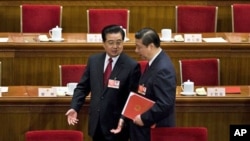One of the highlights of the Chinese Communist Party Central Committee's four-day session was the widely anticipated announcement that Vice-President Xi Jinping would be elevated to vice-chairman of the Central Military Commission.
Willy Lam, a China expert at the Jamestown Foundation in Washington, says this is a clear indication that Xi is in line to replace President Hu Jintao, who steps down in 2012.
"This is important because according to the Chinese Communist Party's tradition, the future leader must be someone with experience, so this will be a critical juncture in the political career of Xi Jinping."
Mr. Hu is the chairman of the military body. He and Xi are the only two civilians.
The party's meeting also set the agenda for China's next five-year plan, from 2011 to 2015.
Lam says he thinks one of the government's priorities will be to follow through on promises to narrow the growing wealth gap.
"This is receiving high priority I think from the high leadership owing to, for example, a rash of labor unrest, which hit a number of multinational firms based in China, as well as domestic Chinese factories. … But obviously, I think, the leadership is very anxious to alleviate social unrest and also to pacify the increasingly angry workers and farmers who feel that they have been left behind, even though there are other sectors that seem to have profited a lot better owing to this unprecedented boom throughout the country."
The awarding of this year's Nobel Peace Prize to jailed Chinese dissident Liu Xiaobo has highlighted recent calls for political reform in China. These calls have come from no less a figure than Premier Wen Jiabao. In a speech to the United Nations in September, Mr. Wen advocated political reform, although some of his comments were not reported by Chinese media.
Mr. Wen describes political reform as necessary, and says without it, China cannot achieve the ultimate goal of economic reform and will lose what it has gained from its modernization drive.
China analyst Lam says he thinks the party leadership deems political reform too sensitive, and did not put it on the agenda at this year's meeting.
Although Communist Party leaders did not discuss political reform, an article in the Beijing Youth Daily newspaper Monday urged people not to see it as such a sensitive issue. The article praised China's current political advances, and quoted the premier's words on the need for reform to achieve the goals of economic modernization.
The U.S. ambassador to China, Jon Huntsman, echoed that thought Tuesday at a town hall meeting that was broadcast live on-line. Huntsman said he believes China will have to loosen politically if it wants to maintain its economic competitiveness.
"You can only maintain your economic leadership position based upon cheap labor for so long - whether that's 10, 20, 30 years - and then you've got to do something beyond, and that something beyond is called innovation. And being able to innovate, you've got to be able to rely upon a certain amount of freedom. You've got to be able to rely upon the free flow of good services, access to capital, the free flow of discussion at universities and an Internet that basically brings people together, that is devoid of outside control."
Huntsman praised the awarding this month of the Nobel to Liu Xiaobo, calling it "a very important gesture toward freedom and democracy." He says the award marks the beginning of "a very important conversation" that includes what he described as "chatter in a lot of corners."
However, Chinese Foreign Ministry spokesman Ma Zhaoxu dodged questions Tuesday about whether there is "chatter" about Liu within the Chinese government.
Ma says China's determination to follow the path of socialism with Chinese characteristics is unswerving and cannot be changed by anyone or any force.
Beijing has loudly and repeatedly denounced the Nobel committee's decision, calling it disrespectful to China's judicial system, since Liu has been convicted of subversion. However, the government has never given details of his offenses.





